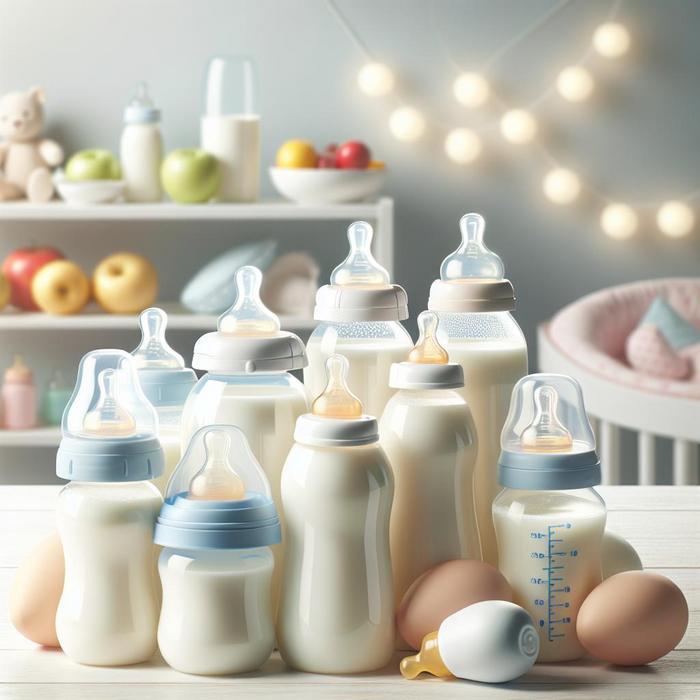Understanding Responsible Feeding and Its Impact on Healthy Development
As parents, we all care deeply about the health and well-being of our children. One of the most critical aspects of this is the concept of responsible feeding. This involves selecting feeding tools, such as healthy development bottles, that not only meet the nutritional needs of our children, but also uphold safety standards, environmental sustainability, and support their physical and mental development.
The Role of Healthy Development Bottles
Firstly, let’s delve into the undeniable benefits of choosing the best baby bottles for our little ones. Healthy development bottles go beyond the basic function of traditional feeding bottles. They are designed based on scientific principles and imbued with several features to aid in the overall development of the child.
Key benefits of these bottles include:
- Promotes natural feeding rhythms and patterns
- Reduces the risk of colic and gas build-up
- Enhances oro-facial development
- Supports neurological development
In essence, these bottles foster a more natural, comfortable, and effective feeding experience for both the baby and the parent.
Responsible Feeding Beyond the Bottle
Responsible feeding transcends the choice of bottles. It extends to the awareness that the decisions we make regarding feeding tools and practices can have a broader impact on society and the environment. A striking example is the initiative by Pernod Ricard, which has launched a pioneering digital label solution to foster responsible consumption habits (Source). Just as this company is encouraging responsible alcohol consumption, as parents, we are tasked with the equally important role of promoting responsible feeding.
Environmentally Conscious Choices
Undoubtedly, our individual choices play a significant part in the transition to environmental sustainability (Source). As such, opting for eco-friendly feeding tools not only benefits our children, but it also contributes positively towards preserving the environment for their future. For instance, choosing BPA-free, recyclable healthy development bottles can help reduce pollution and waste.
As daunting as the task may seem, remember that every small step counts when it comes to making a difference. By practicing responsible feeding, we are setting the foundation for our children’s healthy development and instilling in them the values of stewardship and consciousness for the world around them.
Moving Forward with Responsible Feeding
As we charter the journey of parenthood, let us commit to making informed choices that foster healthy development in our little ones and contribute positively to society and the environment. The rest of this article will delve deeper into practical tips on how to achieve this, including the role of nutrition in responsible feeding, and the importance of adopting simple yet effective feeding practices (Source).
Understanding the Nutritional Aspect of Responsible Feeding
Responsible feeding isn’t isolated to choosing the right development bottles. It extends to what goes into the bottle – the nutrition we provide our children. Studies show that the critical period of growth and brain development is from the pre-natal stage to the child’s first two years of life (Source). As such, providing well-balanced, nutrient-dense meals becomes indispensable.
Optimal nutrition for babies may include breastfeeding for the first six months, followed by the introduction of diverse, nutrient-rich foods while continuing breastfeeding as per the WHO recommendations. These nutritional practices contribute significantly toward boosting a child’s immunity, promoting healthy growth, and fueling neurodevelopment.
The Psychology of Responsible Feeding
Interestingly, responsible feeding expands into the psychological realm as well. It’s about creating positive feeding experiences and fostering healthy relationships with food. The National Association for the Education of Young Children’s position statement emphasizes the need for creating a positive mealtime environment as part of their early learning and nutrition standards (Source).
A few guidelines to create such an atmosphere include:
- Ensuring meals are engaging and joyful experiences
- Respecting the child’s appetite- let them decide when they’re full
- Refraining from using food as a reward or punishment
- Encouraging exploration of varied textures and tastes
These practices help nurture our children’s innate ability to self-regulate their food intake and foster a positive relationship with food, steering them towards a future of balanced and healthy dietary habits.
Teaching Responsible Feeding and Sustainability
Responsible feeding can also be a valuable tool to teach children about sustainability from an early age. By opting for eco-friendly baby bottles and feeding accessories, we can involve our children in a global effort towards a more sustainable lifestyle. Explaining why we have chosen certain products over others can encourage them to think about their future choices concerning the environment. This resource provides a great starting point for understanding how to make lifestyle choices that have less environmental impact.
Collaborating with Professionals for Responsible Feeding
Remember that you’re not alone in this journey of responsible feeding. Collaborating with pediatricians, lactation consultants, dieticians, and other childcare professionals can provide invaluable guidance. Keeping open communication about your child’s feeding patterns, growth, and any concerns you might have ensures a more comprehensive approach to their nutritional health.
In the end, every child is unique, and so are their nutrition and feeding needs. Being responsive to their cues, while consistently offering a varied and healthful diet in a positive, respectful manner, will go a long way towards setting them up for a lifetime of healthy eating habits.
More Than Just a Responsibility
Ultimately, responsible feeding is more than a responsibility; it’s a commitment to nurturing a child holistically – physically, emotionally, and psychologically. It’s about laying a solid foundation for a healthy and prosperous future while considering the impact of our actions on the world they’ll inherit.
Stay Tuned for More
So, as we continue on this journey together, check back here for more tips, insights, and expert advice on how to make every feeding count. Let’s continue to nurture the future, one feed at a time.

